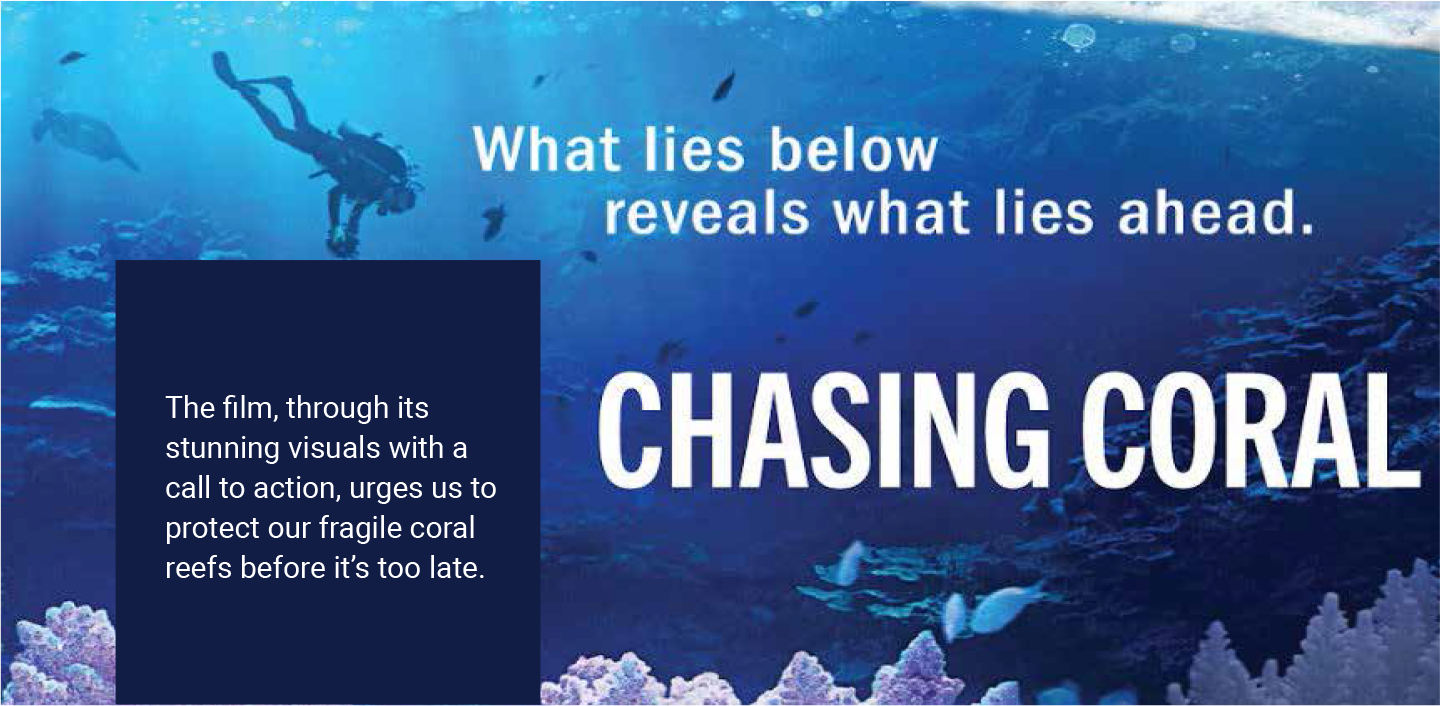The Coral Cure
During my vacation to Andaman & Nicobar Islands last year, I got a chance to witness the magnificent world of corals. Talking to my guide and the friendly locals made me realize that Corals, often mistaken for rock formations, are living organisms. They provide the environmental foundation for marine life, supporting ecosystems that sustain human existence. However, in the last three decades, they’ve been dying off at an alarming rate due to climate change.
To find out more, I decided to watch Chasing Coral, a 90-minute documentary that takes viewers on an underwater journey to explore the plight of coral reefs. Available on Netflix, the 2017 documentary directed by Jeff Orlowski combines stunning visuals with a compelling narrative, urging us to pay attention to a crisis that has largely remained out of sight and out of mind.
Here are the key impacts of climate change on corals:
Coral Bleaching: Climate change is the primary cause of damage to coral reefs. As ocean waters warm, corals experience thermal stress, effectively making them ‘sick’. This stress leads to coral bleaching, where corals lose their vibrant colors and turn white or pale.
Ocean Acidification: Carbon dioxide (CO) absorbed into the ocean from the atmosphere leads to ocean acidification. This process alters seawater chemistry by decreasing pH levels. As a result, coral growth and structural integrity are compromised.
Sea Level Rise: Rising global temperatures cause thermal expansion of seawater, leading to sea level rise. Elevated sea levels can impact coral reefs by increasing sedimentation near land-based sources. Sediment runoff can smother corals, affecting their health and growth.
Changes in Storm Patterns: Climate change alters storm patterns, resulting in stronger and more frequent tropical storms. These storms can cause physical damage to coral reefs, breaking apart fragile structures and disrupting ecosystems.
Altered Ocean Currents: Changes in ocean circulation patterns affect coral reefs. Altered currents impact connectivity and temperature regimes, affecting food availability for corals and hindering the dispersal of coral larvae.
Reduced Calcification Rates: Increased CO levels lead to decreased calcification rates in reef-building organisms. Corals and other reef-associated species struggle to build and maintain their calcium carbonate skeletons, affecting overall reef health.

Visual Spectacle: From the very beginning, Chasing Coral captivates with its breathtaking cinematography. The crystal-clear, colorful digital images showcase the beauty of coral reefs, drawing viewers into their mesmerizing world.
Human Protagonists: The film introduces us to Richard Vevers, a former London advertising executive turned undersea photographer. Vevers becomes a passionate advocate for coral reefs, using his skills to document their decline. In the documentary, several scenes stand out, leaving a lasting impact on viewers. A few highlights I’d like to mention are:
Coral Bleaching Time-Lapse: The film captures the heartbreaking process of coral bleaching. As ocean temperatures rise, corals become stressed and expel the algae living in their tissue, causing them to turn completely white. The documentary visually documents this phenomenon, emphasizing the urgency of climate change’s impact on coral reefs.
International Symposium Presentation: Toward the film’s end, the team presents time-lapse images at an international symposium. As coral colonies deteriorate into algae-covered skeletons, the scientists’ pained expressions mirror the devastation unfolding on screen.
Exploring Coral Reefs: The documentary zooms out to showcase the fascinating creatures that inhabit coral reefs. Marine biologist Ruth Gates aptly refers to the Great Barrier Reef as ‘the Manhattan of the ocean’, highlighting its density, diversity, and importance.
“Chasing Coral” compels us to act. We must raise awareness, support conservation efforts, and address climate change to save these vital ecosystems. I would rate this art piece 8/10. This documentary is suitable for anyone who wishes to explore more about the mystic world of corals and is interested in climate action and climate change.

C Shijin Shah
Associate Counsellor
CII
